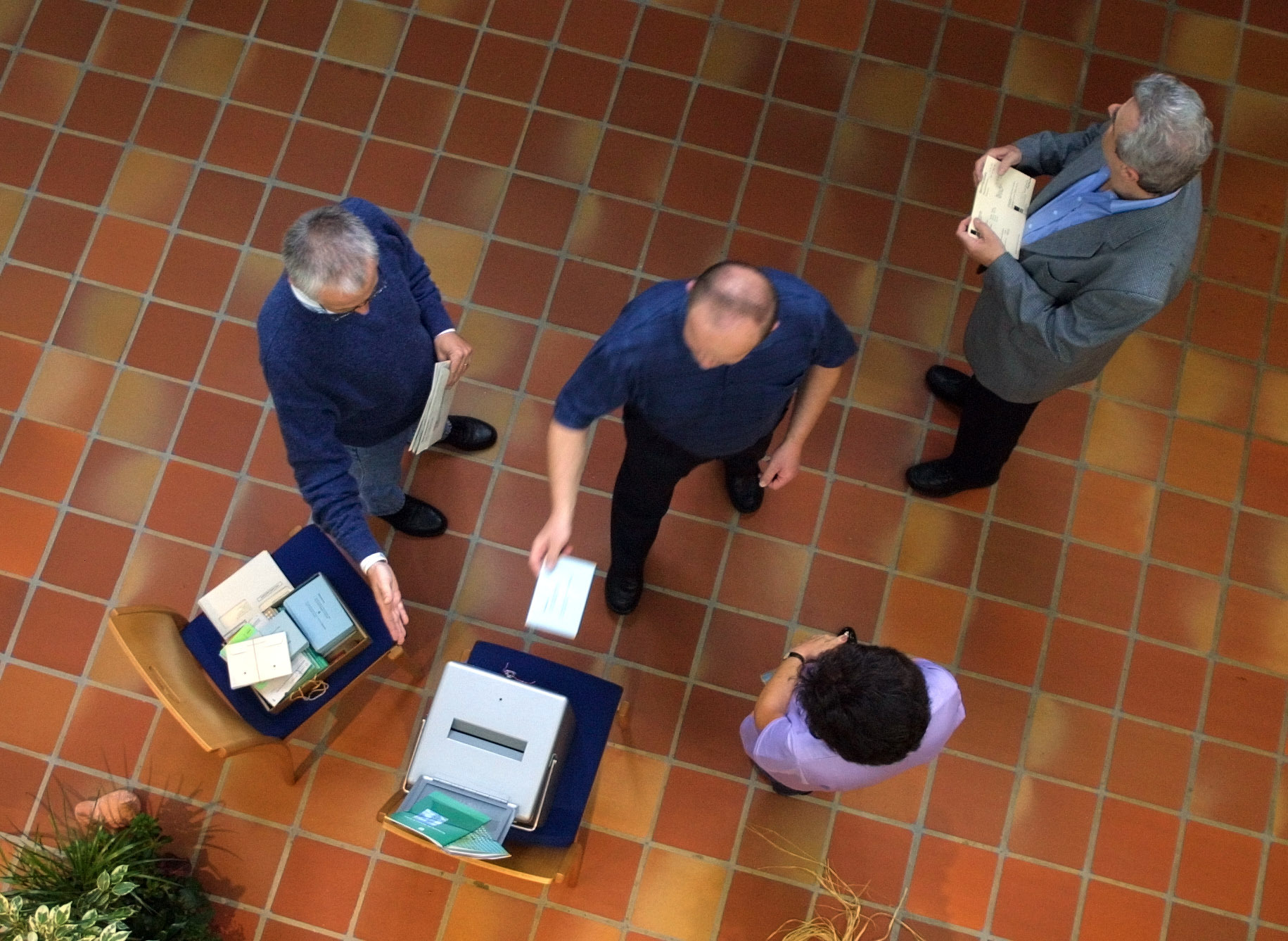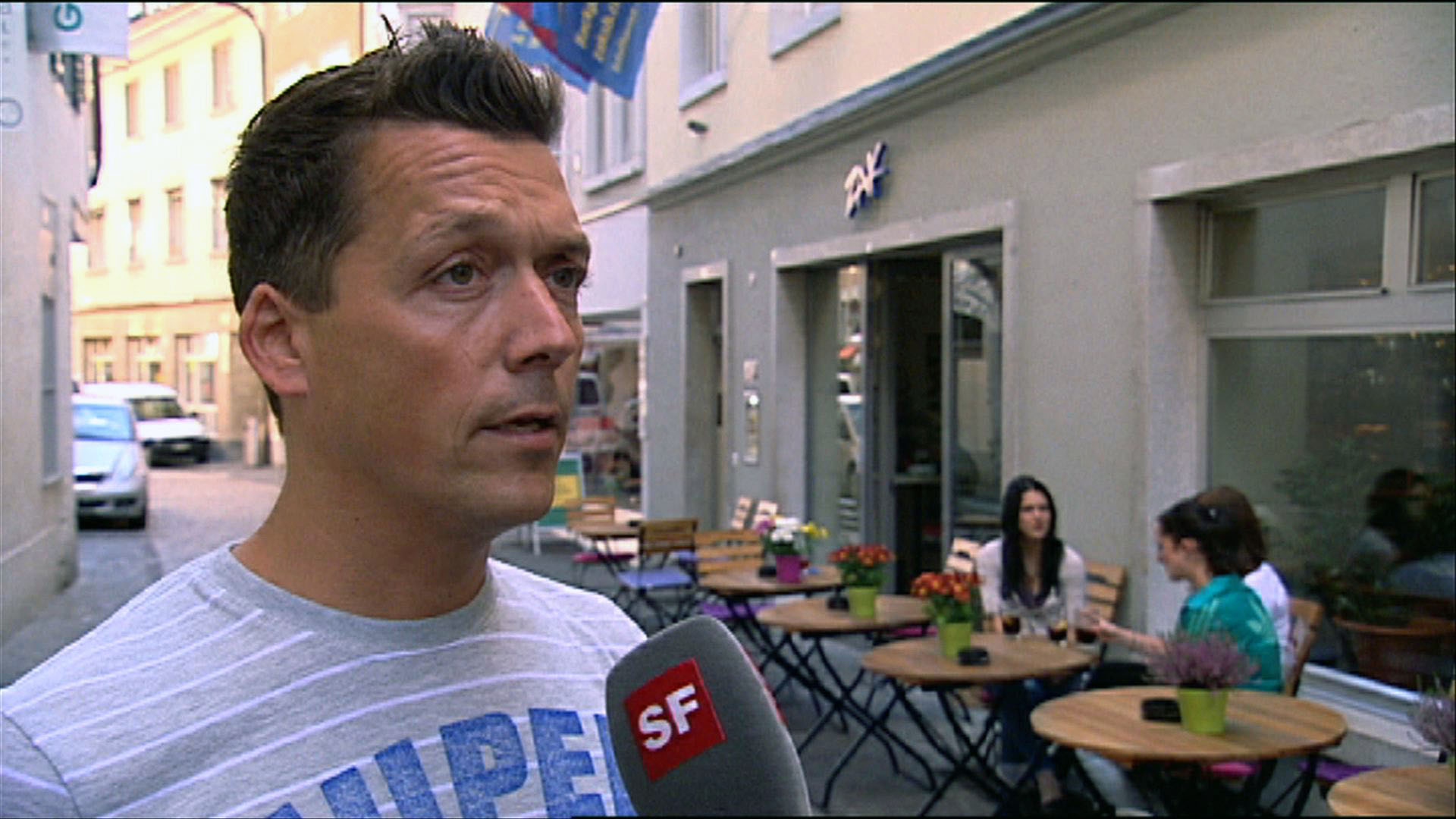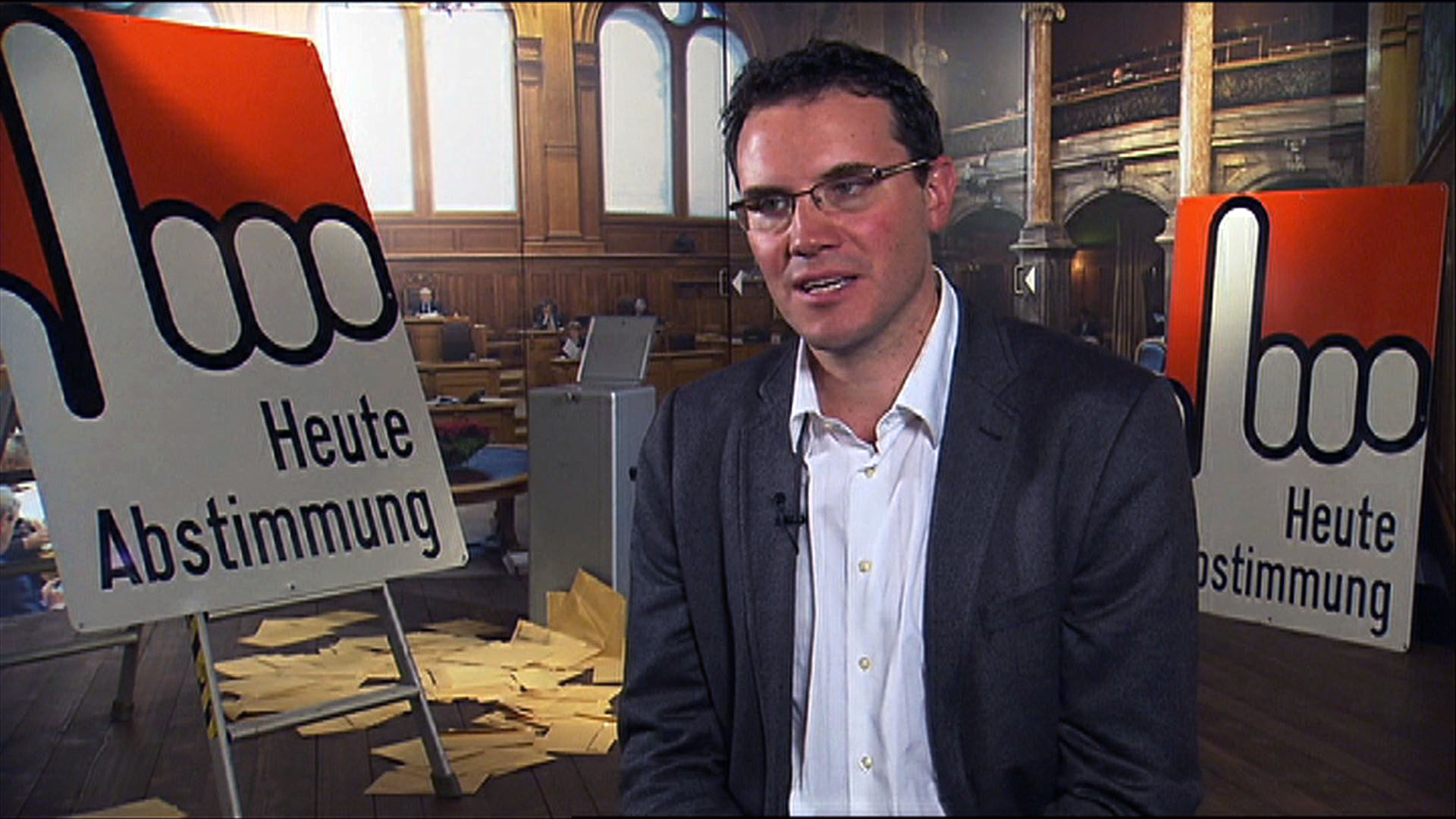Democratic? The canton where voting is compulsory

Jutting out into Germany, Schaffhausen is Switzerland’s most northerly canton. It also has another claim to fame: it’s the only canton in Switzerland – and one of a small number of places in the world – where you will be fined for not voting.
Canton Schaffhausen’s parliament voted on March 17 to double the penalty to CHF6 ($6.6). This may seem a small amount, but for the region’s proud authorities and residents, it has a symbolic value.
It is a sunny spring morning as the train pulls into Schaffhausen station. We have already passed the Rhine Falls, Europe’s largest waterfall, on the way in. After alighting, it is only a few steps and you are in the heart of the canton’s compact capital.
Although it’s early, people are already bustling along the main Vordergasse shopping street, past the frescoed Haus zum Ritter, one of the city’s many richly decorated baroque buildings.
Schaffhausen is a small canton, home to almost 80,000 people or around 1% of the Swiss population. Although in many ways the canton has moved with the times – a recent drive to diversify the Zurich-oriented economy has brought multinationals such as Unilever into the area – there is definitely a sense of tradition about the place.
And this is reflected in its attitude to voting. “Canton Schaffhausen is the only canton in Switzerland that still has the compulsory voting for ballots and elections,” said cantonal chancellor Stefan Bilger, from whose office windows the 16th century Munot fortress, another city landmark, can be glimpsed.
Compulsory voting, common in the 19th century, was abolished in the other 25 cantons by the 1970s, explained the senior official, whose mandate includes overseeing votes. But Schaffhausen repeatedly voted down moves to abolish the practice.
Gentle pressure
“The advantage of compulsory voting is that it is a gentle way of putting pressure on citizens to get more involved in political issues,” Bilger told swissinfo.ch.
In Switzerland, citizens are called, under the system of direct democracy, to vote on important issues through referenda and people’s initiatives a few times a year. Voter turnout in Schaffhausen is consistently 15%-20% higher than the Swiss average. For the February 9 vote on capping immigration, for example, it stood at 70.5%, compared with an 55.8% nationwide average.
But Bilger maintains this is not due to the fine. It is relatively easy to be excused from voting. Accepted reasons, which are not checked, include holiday or illness, can be noted on the returned polling card. What is more, there is still three days’ grace to hand the card in, without an excuse, after voting day.
Only if a non-voter has failed to comply with the above is he or she likely to be fined the current CHF3 and this is normally added to a local authority bill at the end of the year.
This is certainly a lot milder than Australia – one of the more than 20 countries which has compulsory voting – which levies a A$20 (CHF16) fine and where non-payment could see you in court.
Civic duty
What motivates people is a respect for undertaking their civic duty, Bilger said. This can be seen in the high number of people physically turning out at the polls and the low numbers of postal votes.
“People see the carrying out of their voting rights as a privilege and perhaps even with a bit of pride.”
This sentiment was largely on the city’s streets. “I never forget a vote and all my acquaintances vote,” said a retired lady in her 70s as she walked up the steps among the vines towards the Munot. “We are a small, close-knit canton, and everyone meets up at the polls. It’s a tradition here.”
“I always vote and so do my friends,” said a young man in his 20s, as he took a cigarette break in the morning sun in the city centre. “It’s important to take your voting rights seriously, especially when there are so many places where you can’t vote.”
But he conceded that young people might not be so interested in politics. “I think it only really comes after the age of 20,” he said.
Some non-voters have gone public. Hotelier René Laville was interviewed on Swiss public television about his views.

More
René Laville on why he doesn’t vote
Back to the future?
That the fine was doubled – as part of a general overhaul of the electoral law – without any opposition in the cantonal parliament is also symptomatic. It was felt that the amount, unchanged for over 40 years, should be brought into line with inflation (which would have strictly made it CHF7). Before 1973, the fine had stood at CHF1 for 100 years.
The CHF6 levy is likely to come into force in 2015. It will also help cover some of the associated costs of administering the fine system.
Norbert Neininger, the editor in chief and publisher of the local daily Schaffhauser Nachrichten, said the canton’s appetite for politics and debate was also the lifeblood of his newspaper.
“This may sound extraordinary, but I don’t think you should make voting and electing any easier because it should somehow be in people’s consciousness that it is something of value,” Neininger told swissinfo.ch from his office on the Vordergasse.
He doesn’t think much of postal voting, preferring the final act of casting his vote after discussing the issues at home. Although he accepts that the pressures of modern life means that it is not always possible to vote in person.
But some critics, such as political scientist Georg Lutz in a Swiss public television interview, have argued, that compulsory voting does not necessarily mean more people power.

More
Georg Lutz is unconvinced by compulsory voting
Schaffhausen’s voters will be back at the polls on May 18. Topping the bill is a proposal to introduce a nationwide minimum wage, as well as the controversial purchase of new fighter jets for the Swiss Air Force.
On a local level, citizens will be asked if the canton should be reorganised, as 14 of the area’s 26 communes have 1,000 residents or less, making local administration inefficient and costly.
This time around, the people of Schaffhausen will not be asked whether they want to maintain or do away with compulsory voting.
In Western Europe: Belgium, Luxembourg, Liechtenstein,
the Swiss canton of Schaffhausen, Cyprus and Greece (not enforced).
Compulsory voting legislation exists in some form in most countries of Central America and South America with varying degrees of enforcement.
In Australia compulsory voting was introduced in 1924, mainly as a response to lower voter turnout.
In Singapore it was introduced in 1959. Fiji and Thailand gained much later in 1997.
(Source: Electoral Commission Britain, The International Institute for Democracy and Electoral Assistance)
Schaffhausen is the northernmost canton in Switzerland, and is up to 80% surrounded by Germany.
It is famous for its wine, especially its Pinot Noir, but also for the Rhine Falls, Europe’s most powerful waterfall, which attracts around 3 million visitors a year.
It covers 298 kilometres squared – equivalent to 0.7% of the Swiss territory.
Up to 80,000 people live in the canton, with almost a half living in its capital, also called Schaffhausen. Foreigners make up almost 19,000.
Over the last 10-20 years it has worked to increase its attractiveness to industry and high tech – and offer competition to cantons such as Zurich, Vaud and Zug. Unilever, Bosch and Abbott Laboratories are all present in the canton, Wal-Mart and John Deere have their headquarters there.
(Source: Canton Schaffhausen, Schaffhauserland Tourism, swissinfo.ch)

In compliance with the JTI standards
More: SWI swissinfo.ch certified by the Journalism Trust Initiative











You can find an overview of ongoing debates with our journalists here . Please join us!
If you want to start a conversation about a topic raised in this article or want to report factual errors, email us at english@swissinfo.ch.